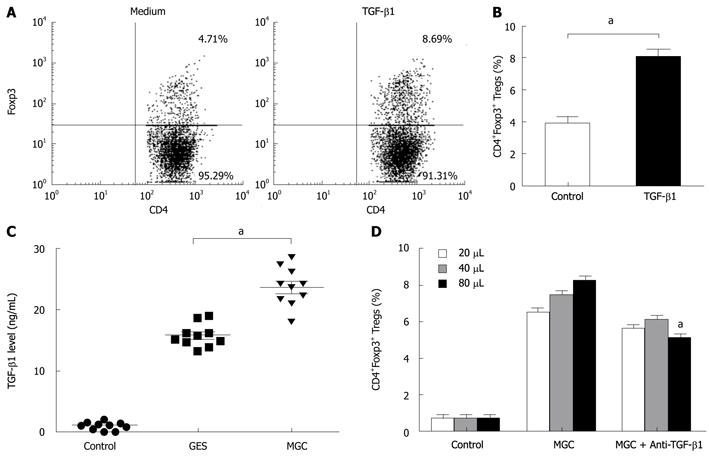Copyright
©2011 Baishideng Publishing Group Co.
World J Gastroenterol. Apr 21, 2011; 17(15): 2019-2027
Published online Apr 21, 2011. doi: 10.3748/wjg.v17.i15.2019
Published online Apr 21, 2011. doi: 10.3748/wjg.v17.i15.2019
Figure 3 Gastric cancer cells producing transforming growth factor-β1 can partially mediate the conversion of CD4+CD25- T cells to CD4+Foxp3+ Treg cells.
A: Representative flow cytometry analysis of CD4+Foxp3+ Tregs frequency in the presence or absence of transforming growth factor-β1 (TGF-β1); B: Summarized data showed that CD4+Foxp3+ Tregs frequency increased in presence of TGF-β1 in comparison with that in absence of TGF-β1 (aP < 0.05); C: Gastric cancer cell TGF-β1 production was assessed by enzyme-linked immunosorbent assay in supernatants. (aP < 0.05); D: TGF-β1 blocking antibody or control IgG1 antibody was added to the co-culture in order to monitor impairment of Tregs development within the coculture system. Different volumes of supernatant protein concentrate (20, 40, and 80 μL) from MGC were added to the co-culture system. (aP < 0.05).
- Citation: Yuan XL, Chen L, Zhang TT, Ma YH, Zhou YL, Zhao Y, Wang WW, Dong P, Yu L, Zhang YY, Shen LS. Gastric cancer cells induce human CD4+Foxp3+ regulatory T cells through the production of TGF-β1. World J Gastroenterol 2011; 17(15): 2019-2027
- URL: https://www.wjgnet.com/1007-9327/full/v17/i15/2019.htm
- DOI: https://dx.doi.org/10.3748/wjg.v17.i15.2019









